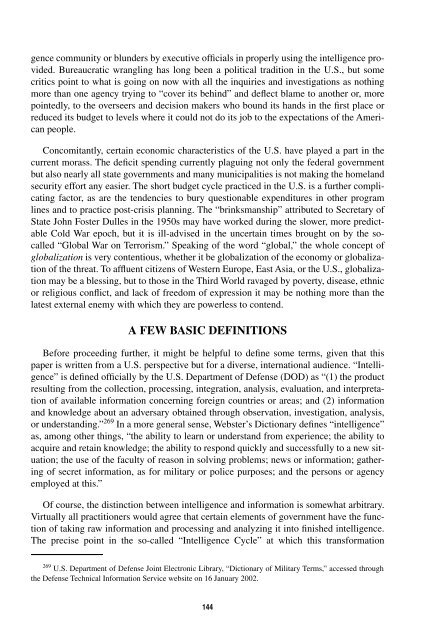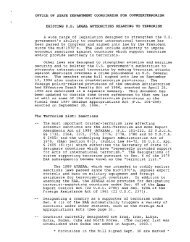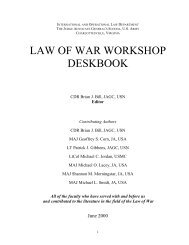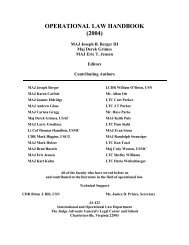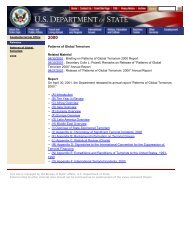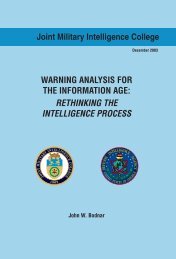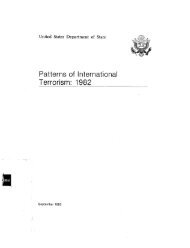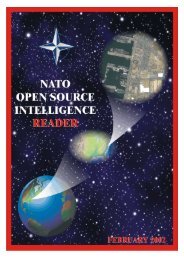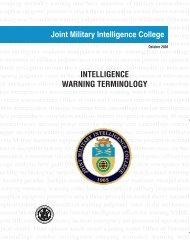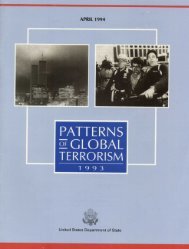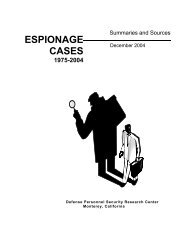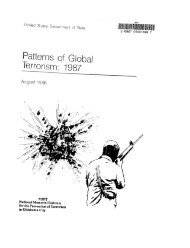learning with professionals - Higgins Counterterrorism Research ...
learning with professionals - Higgins Counterterrorism Research ...
learning with professionals - Higgins Counterterrorism Research ...
You also want an ePaper? Increase the reach of your titles
YUMPU automatically turns print PDFs into web optimized ePapers that Google loves.
gence community or blunders by executive officials in properly using the intelligence provided.<br />
Bureaucratic wrangling has long been a political tradition in the U.S., but some<br />
critics point to what is going on now <strong>with</strong> all the inquiries and investigations as nothing<br />
more than one agency trying to “cover its behind” and deflect blame to another or, more<br />
pointedly, to the overseers and decision makers who bound its hands in the first place or<br />
reduced its budget to levels where it could not do its job to the expectations of the American<br />
people.<br />
Concomitantly, certain economic characteristics of the U.S. have played a part in the<br />
current morass. The deficit spending currently plaguing not only the federal government<br />
but also nearly all state governments and many municipalities is not making the homeland<br />
security effort any easier. The short budget cycle practiced in the U.S. is a further complicating<br />
factor, as are the tendencies to bury questionable expenditures in other program<br />
lines and to practice post-crisis planning. The “brinksmanship” attributed to Secretary of<br />
State John Foster Dulles in the 1950s may have worked during the slower, more predictable<br />
Cold War epoch, but it is ill-advised in the uncertain times brought on by the socalled<br />
“Global War on Terrorism.” Speaking of the word “global,” the whole concept of<br />
globalization is very contentious, whether it be globalization of the economy or globalization<br />
of the threat. To affluent citizens of Western Europe, East Asia, or the U.S., globalization<br />
may be a blessing, but to those in the Third World ravaged by poverty, disease, ethnic<br />
or religious conflict, and lack of freedom of expression it may be nothing more than the<br />
latest external enemy <strong>with</strong> which they are powerless to contend.<br />
A FEW BASIC DEFINITIONS<br />
Before proceeding further, it might be helpful to define some terms, given that this<br />
paper is written from a U.S. perspective but for a diverse, international audience. “Intelligence”<br />
is defined officially by the U.S. Department of Defense (DOD) as “(1) the product<br />
resulting from the collection, processing, integration, analysis, evaluation, and interpretation<br />
of available information concerning foreign countries or areas; and (2) information<br />
and knowledge about an adversary obtained through observation, investigation, analysis,<br />
or understanding.” 269 In a more general sense, Webster’s Dictionary defines “intelligence”<br />
as, among other things, “the ability to learn or understand from experience; the ability to<br />
acquire and retain knowledge; the ability to respond quickly and successfully to a new situation;<br />
the use of the faculty of reason in solving problems; news or information; gathering<br />
of secret information, as for military or police purposes; and the persons or agency<br />
employed at this.”<br />
Of course, the distinction between intelligence and information is somewhat arbitrary.<br />
Virtually all practitioners would agree that certain elements of government have the function<br />
of taking raw information and processing and analyzing it into finished intelligence.<br />
The precise point in the so-called “Intelligence Cycle” at which this transformation<br />
269 U.S. Department of Defense Joint Electronic Library, “Dictionary of Military Terms,” accessed through<br />
the Defense Technical Information Service website on 16 January 2002.<br />
144


